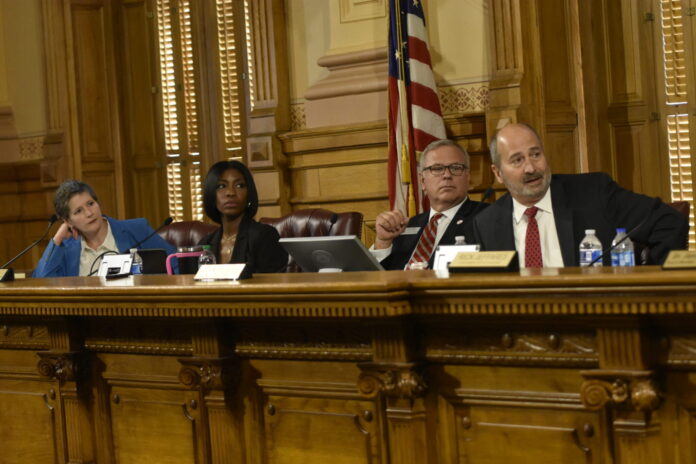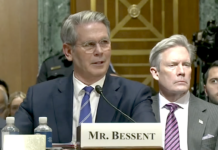
(Georgia Recorder) — Georgia State Election Board officials will seek assistance from the state Legislature to establish clearer guidelines for maintaining accurate voter lists following a tense debate Tuesday over mass voter challenges.
The board voted Tuesday to ask state lawmakers to update rules so that it would be more difficult for county election boards to methodically reject thousands of challenges to voters’ eligibility that are increasingly being filed across the state.
State Election Board Executive Director Mike Coan presented findings of an investigation into voter challenges in several metro Atlanta counties, revealing systematic denials, particularly of challenges filed in large batches.
Coan suggested that state and local officials ensure voter challenges answer the question of how to handle large volumes of voter challenges. He called for the legislature and election board to develop better guidelines for county boards reviewing voter eligibility challenges.
Coan accused several county election boards of dismissing voter challenges that used much more sophisticated technology than those used by the government.
“When you have people out there who have technology that’s far superior, you should be listening, not turn your head the other way,” he said.
The mass voter challenge controversy has been a mainstay in Georgia over the last several years since the feverish push to overturn the 2020 presidential election results after Trump narrowly lost to Democrat Joe Biden in Georgia by fewer than 12,000 votes.
Many conservatives have argued that voter registration lists need to be purged of ineligible votes, while Democrats and progressive activists have argued that mass voter challenges aim to intimidate and remove voters who are eligible to cast ballots. The Georgia board requested last month that Coan report his findings of an investigation into allegations that eight election boards in counties led by Democrats are improperly dismissing complaints about the eligibility of tens of thousands of voters.
Coan emphasized the need for uniformity and non-discrimination in voter challenges, citing the National Voter Registration Act of 1993 and U.S. Supreme Court rulings. He pointed out that many challenges that have been filed were based on outdated addresses or voters registered in non-residential locations.
“I will tell you this, the evidence in my findings reveals that the challengers are not targeting voters based on any demographic, race, party, ethnicity. Anybody that says that, you’re out to lunch. It’s not true,” said Coan, a former Republican state House legislator.
Federal law mandates a 90-day quiet period prior to an election that prevents some removals of voters from registration lists. However, Georgia’s new law states that voter eligibility challenges filed within 45 days of an election cannot be heard until after a county’s certification is completed.
The State Election Board’s meeting Tuesday was held several weeks ahead of the Nov. 5 general election, where rules adopted by three right-wing members loyal to former President Donald Trump are facing legal challenges.
Conservative election board members Janelle King, Janice Johnston and Rick Jeffares, praised by former Trump during a recent Atlanta rally, voted Sept. 23 to have Coan look into the claims that led to the DeKalb County Republican Party alleging that the DeKalb board is not following the law for reviewing voter eligibility complaints.
Atlanta Democratic state Rep. Saira Draper criticized the use of the artificial intelligence app EagleAI, a method that was rejected by county election offices. The election attorney highlighted that over 300,000 challenges in 2021 were dismissed as frivolous.
“Eagle AI is a third-party program that scrapes the internet that was rejected by county election offices as being worse than the programs that they have already,” Draper said. “Anybody that knows about regular list maintenance processes knows that the documents and the databases that the Secretary of State already uses are verified databases.”
Draper said it’s important for state and county election officials to respect the expertise of those in the field and criticized the misinformation about election challenges. She said she was embarrassed to hear the misinformation being spread Tuesday about voter challenges.
“There are people who are sore losers who have brought frivolous voter challenges, targeting Democratic counties, and those challenges have been appropriately dismissed, and now they want a second bite at the apple, both at the courts and here at the State Election Board, one week before early voting starts,” Draper said.
Election board member King pushed back on the notion that the board’s probe targeted Democratic leaning counties. The investigation was prompted by the DeKalb Republican Party leader filing a lawsuit over the county election board’s handling of challenges as well as getting public input about issues at other counties.
“To assume that we are single-handedly picking out counties is absolutely ridiculous,” King said.
Cobb County officials argued against the mass denial of inactive voters and the unannounced nature of the investigation.
Republican Debbie Fisher, a Cobb County election board member, said that her board ignored the law this year when it dismissed challenges filed against inactive voters who had not voted in at least eight years.
Daniel White, attorney for Cobb County Board of Elections and Registration, said the full Cobb board was not notified in writing about the circumstances prior to Coan’s visiting election office. White clarified that their board policies were based on state and federal laws.
“What this appears to be, to me, is an attempt to sort of set a narrative between the last meeting and this meeting,” White said. “It doesn’t seem to be fact-finding. It doesn’t seem to be an actual investigation. You didn’t follow the process that you normally follow, to refer it to the Secretary of State or anybody else who would tell us what sections you’re citing.”
Johnston said the changes to the voter challenge law need to be addressed carefully and deliberately and fairly so that only eligible voters are on the voter list and no one is disenfranchised.
“I’m sure any method that’s used is not completely 100% error-free, but perhaps some guidelines will help move that toward an accurate process with always the ability for a voter to be replaced on the voter list or given the opportunity to vote depending on the challenge is provided a quick review,” Johnston said.
The Atlanta Journal-Constitution reported this week that county election boards in the metro Atlanta region have rejected more than 45,000 voter eligibility challenges filed by conservative activists since July. The analysis found that fewer than 50 voters were removed from the rolls in Gwinnett, Fulton, Cobb, and DeKalb counties, each led by Democrats.
A federal judge in Atlanta ruled in January that the right-wing, Texas-based nonprofit True the Vote did not violate the Voting Rights Act as alleged in a Fair Fight Action lawsuit that said the group intended to intimate voters as it challenged the eligibility of thousands of Georgia voters leading up to a pair of U.S. Senate runoffs won by Democrats in early 2021.







